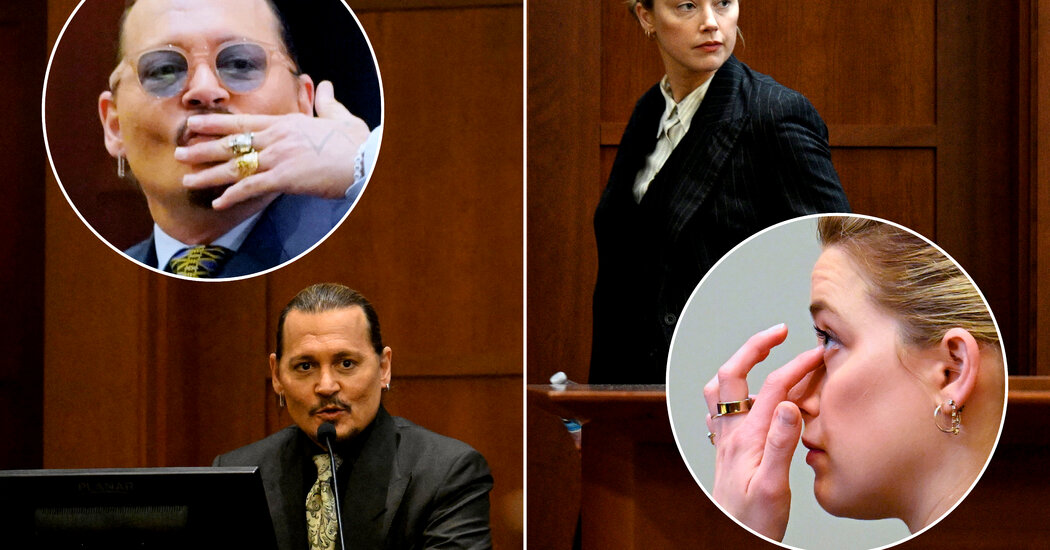
Anyone else who appears in court risks being lifted into an internet folk hero or smeared as a liar. Heard’s attorney Elaine Charlson Bredehoft is branded a “Karen” (once a term for a racist white woman, it has since been flattened into an all-purpose misogynistic slur) and conspiratorially constructed as an undercover Depp fan, while Vasquez is cast as a Depp love interest, hailed as an internet sensation for her “intimate” interactions with her client. Seemingly every woman tangentially involved in the case has been imbued with imagined Depp-lust. Dr. Shannon Curry, an expert witness called by Depp’s team, has been celebrated for “exchanging glances” with Depp on the stand; even Curry’s husband, who she mentioned once delivered muffins to her office, has been inflated into a treasured fan fiction character referred to as “the muffin man.” Meanwhile, Depp supporters have harassed two of Heard’s expert witnesses off the medical professional site WebMD, flooding their profiles with one-star reviews.
Johnny Depp’s Libel Case Against Amber Heard
In the courtroom. A defamation trial involving the formerly married actors Johnny Depp and Amber Heard is currently underway in Fairfax County Circuit Court in Virginia. Here is what to know about the case:
The internet livestreaming of the trial has created its own virtual sport. Each day hundreds of thousands of viewers congregate on YouTube livestreams, like the one hosted by the Law & Crime Network, and type comments into a racing sidebar chat. Some pay as much as $400 to have their comments highlighted and pinned to the top of the chat — the more you pay, the longer your commentary lords over the proceedings. During Wednesday’s stream, one participant paid to say that Heard “has a nesting snake on her head”; another promoted his YouTube novelty song about Heard’s legal team.
The immediacy of the livestream and its commentary gives viewers the illusion that they can somehow influence the outcome of the case; someone is always pleading for an internet artifact to be “forwarded to Camille,” as if obsessive fan attention alone might crack the case. This week, Depp’s team called a witness who surfaced after he posted a tweet in response to a pro-Depp Twitter account’s coverage of the trial.
Even if they cannot influence the trial itself, viewers can shape public opinion in real time. Once a fan fiction scenario gains enough momentum to achieve escape velocity, it is elevated into mainstream tabloids, which are rife with reports of Depp’s courtroom flirtations and epic witness-stand one-liners. Once gossip journalists had to craft celebrity story lines themselves, but now the narratives are lifted straight from social media and enshrined as Hollywood canon. Gossip sites are regurgitating banal celebrity internet activity as heartwarming Depp content: Jennifer Aniston followed Johnny Depp on Instagram as a “subtle sign of support,” the magazine claimed, and Depp followed Aniston back as a “sweet gesture.”
But when Julia Fox supported Heard on Instagram, she soon became the focus of articles about how she was hypocritical and “downright stupid.” When a celebrity does not provide such dubious material, it may simply be invented: recently a YouTuber edited and dubbed trial footage to make it seem as if Heard’s “Aquaman” co-star, Jason Momoa, has appeared on the stand to fawn over Depp’s lawyer.
It’s tempting to ignore all of this — to refuse to feed the machine with even more attention. But like Gamergate, which took an obscure gaming-community controversy and inflated it into an internet-wide anti-feminist harassment campaign and a broader right-wing movement, this nihilistic circus is a potentially radicalizing event. When the trial ends this week, the elaborate grassroots campaign to smear a woman will remain, now with a plugged-in support base and a field-tested harassment playbook. All it needs is a new target.






